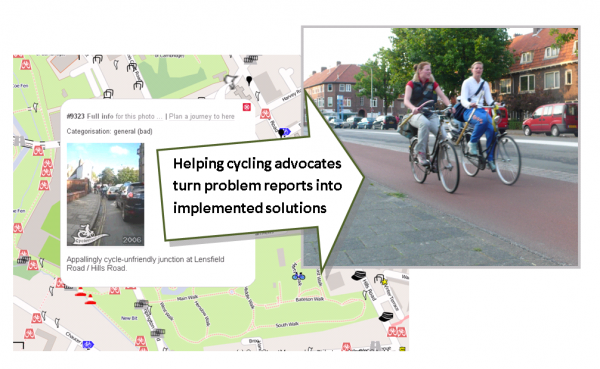We presented the Cyclescape project to the Cyclenation/CTC conference in October 2011, to an audience eager to know how it will help their campaigns.
Here’s the presentation we gave, and scroll down for questions and answers.
[and Text-only version]
Here are some of the questions we were asked, and answers to them.
1. How do I start a group in my area? What if I'm on my own?
Groups will go to a simple webform to apply for a Cyclescape site for their area. They can customise it in various ways.
A person on their own will also be able to create a new group for their area. They can then welcome others who live nearby, to join that group.
It is an explicit goal of the system that we help new campaign groups to spring up and provide them with resources to get them going easily.
2. Can there be more than one group covering a particular area?
Yes. There is no restriction on overlapping groups, as many areas have more than one campaign group.
Groups can, if they want, choose to campaign together. We hope that, over time, the system will help increase co-working between groups so that together they have a stronger voice.
3. How much information can groups share with each other?
Basically as little or as much as they want.
The default is that discussions are not shared, i.e. each group has its own area that is private. It is up to the people running each group to open things up beyond that if they want.
Groups can choose to make their discussions open-access if they wish; they can control who is added as a member of their group; and they can choose to share particular discussion threads if they wish.
The library of best practice will contain national and local examples. The national ones are usually shared. This will mean that a group can publish how they solved a particular campaigning issue, or share best practice photos and documents.
4. In our city we have a problem that the council put in "Pinch Points". They won't listen to us – how can this system help?
Firstly, the system will help identify who will benefit by its removal, by seeing who cycles through the area, so that you can increase the number of people who can push to make the council change its view. We know this can really make a difference as our campaign in Kingston Street in Cambridge did exactly this (only we had to work out manually who these people were!).
Secondly, the system will automatically suggest examples from elsewhere around the country where the problem has been solved. It will only need one group to create a resource about this.
Thirdly, the system could also provide evidence of where a compromise has been achieved. Our experience in Cambridge, for instance, is that pinch points of 3.1 to 3.9 metres cause the most problems.
The system will basically help you build the best possible case for removing the pinch point, as easily as possible.
5. I'm keen to get involved with Cyclescape but the technology scares me, are you running any tutorials or workshops that can help me get started?
It is a strong aim that the system is self-explanatory and easy to use.
We shall also provide online guides to explain how to get started, and we'll think about organising a workshop, perhaps at another conference where we can demonstrate the system.
6. How does the sharing of best practice work?
Groups can create resources which describe how particular successes have been achieved.
Groups can add photos of good and bad practice. The existing library of over 30,000 photos from CycleStreets will also be available in the system.
Groups will also be encouraged to construct summaries of national/local policy documents, which will be well-categorised (by tagging with key words). This will help other campaigners nationally find out what guidance exists quickly and be able to quote it. This will mean that discussions on, for instance, cycling in pedestrian zones, would automatically pick out the key guidance, show photos and newspaper reports from where it has been achieved, etc.
We want to expand the photographic aspect of the system to create full galleries and downloadable high-quality images of best practice and are seeking funding to expand the system to include this.
7. Is it free?
Yes, groups can create a Cyclescape site for their area completely free of charge.
This is possible thanks to a grant of £27,000 that we obtained from GeoVation. We recognised when applying for this grant that groups all around the country face the same problems, but that few groups have much funding. It therefore made sense to create a campaigning platform that all could use, to avoid the need to reinvent the wheel continually.
8. Will it use the same username / password as cyclestreets.net to login?
We haven’t yet finalised that issue. However, we are hoping so.
9. Will it need further funding in the future?
The system is intended not to require ongoing funding.
However, our initial grant does have a shortfall, and we are hoping to add some additional advanced features in the light of feedback during our consultation over the summer. We need around £10-20k for this, so if you know of a potential source of funding that would help fund sharing of best practice, please do let us know.
The system is open source and so we are going to be working to get people involved from the cycling community who can help with the development.

